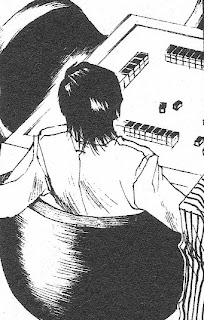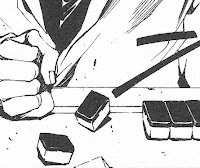 The very first thing we learn about Makoto Kubota in Kazuya Minekura’s Wild Adapter, even before we know his full name, is that he is an exceptionally talented mahjong player. For someone that is difficult to read, knowing this can provide some insight into his character. The qualities Kubota exhibits as a skilled mahjong player are demonstrative of his character and personality as a whole. I’ve been seriously playing mahjong, specifically riichi mahjong (which is the variant in Wild Adapter), for a little over a year now. I love the game but am admittedly still very much a beginner. As such, I have a tremendous amount of admiration for those players that do possess great skill.
The very first thing we learn about Makoto Kubota in Kazuya Minekura’s Wild Adapter, even before we know his full name, is that he is an exceptionally talented mahjong player. For someone that is difficult to read, knowing this can provide some insight into his character. The qualities Kubota exhibits as a skilled mahjong player are demonstrative of his character and personality as a whole. I’ve been seriously playing mahjong, specifically riichi mahjong (which is the variant in Wild Adapter), for a little over a year now. I love the game but am admittedly still very much a beginner. As such, I have a tremendous amount of admiration for those players that do possess great skill.
Kubota’s mastery of the game is one of the many reasons that he captures the interest of the Izumo syndicate. While on the surface mahjong may at first appear to be mostly about luck, there is actually a huge amount of strategy involved, especially as players become more skilled. In many ways, you have to make your own luck. Mahjong requires mental flexibility, the willingness to change strategies, quick thinking, and the ability to make accurate deductions from limited information. Kubota is shown to exhibit these qualities throughout Wild Adapter. He is extremely intelligent and as I previously mentioned, difficult to read. Having a good “poker face” is valuable in mahjong because it keeps the other players guessing. Playing mind games and thereby manipulating the behavior of your opponents is a valid technique that of course has applications outside of mahjong as well. Kubota keeps everyone around him guessing, even those closest to him, and reveals very little information about himself. He is also exceptionally observant of others and his surroundings. So, while they might not be able to read him, he can easily read other people and anticipate their actions. He also makes it very clear early on in Wild Adapter that he is more than willing to play dirty, and not just at mahjong.
At one point in Wild Adapter, Jun Sekiya, one of the leaders of Izumo’s rival syndicate Tojou, makes a mahjong reference when he states “Riichi. Our ultimate wild card.” While the meaning behind his statement is fairly clear in context, and I knew what he was talking about, most people are probably not familiar with the term “riichi.” Riichi gives riichi mahjong its name and is one of the rules that sets it apart from all other variants. Under certain conditions, players may declare riichi when they only need one more tile to win the hand. It provides an opportunity to gain more points, sometimes incredibly so, but it also severely limits the players’ options for the rest of the hand. And so, Sekiya’s ominous declaration of “riichi” means that he is close to winning, but it also means that he is locked into one course of action. When riichi is declared in mahjong, there is always a perceptible change in mood at the table. Things get tense and people get nervous, especially if riichi is called early on in a hand. Opponents play even more carefully than they already have been and are very cautious with their discards.
 Mahjong is both an offensive and a defensive game. It is very rare that any one player will be able to win every hand in a given match (I’ve certainly never seen it happen). Keeping that in mind, players have to constantly weigh the potential risks and benefits of their actions. Skilled players like Kubota are incredibly adept at this, knowing when to play aggressively and when to take a more conservative approach. Kubota’s aptitude for mahjong clearly makes him an extremely formidable opponent away from the table, too.
Mahjong is both an offensive and a defensive game. It is very rare that any one player will be able to win every hand in a given match (I’ve certainly never seen it happen). Keeping that in mind, players have to constantly weigh the potential risks and benefits of their actions. Skilled players like Kubota are incredibly adept at this, knowing when to play aggressively and when to take a more conservative approach. Kubota’s aptitude for mahjong clearly makes him an extremely formidable opponent away from the table, too.
This post is part of the Wild Adapter Manga Moveable Feast.

This is a terrific post! Thanks for participating!
Thanks for stopping by, and thanks for hosting the Feast! ^_^
I’m completely clueless about mahjong, so I find your riichi explanation really illuminating. Thanks for the post!
I’m so glad that I could help! Thank you for taking the time visit and comment.
(Please forgive the belated comment, I’ve just stumbled across the roundtable.)
Are you familiar with Minekura-sensei’s other work? Riichi mahjong is featured in Saiyuki as well; if you’ve not seen this detailed analysis of the pivotal game from Vol. 9, I think you might find it quite interesting: http://ranith.livejournal.com/5922.html
No apologies needed, and thanks for visiting! ^_^
I am indeed familiar with Saiyuki, but I hadn’t seen that game analysis before. Thank you so much for posting the link!